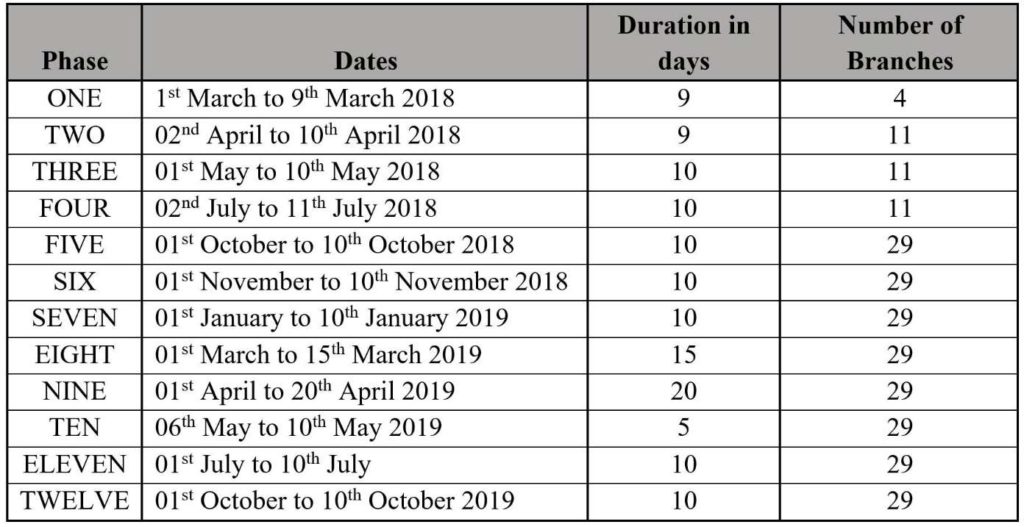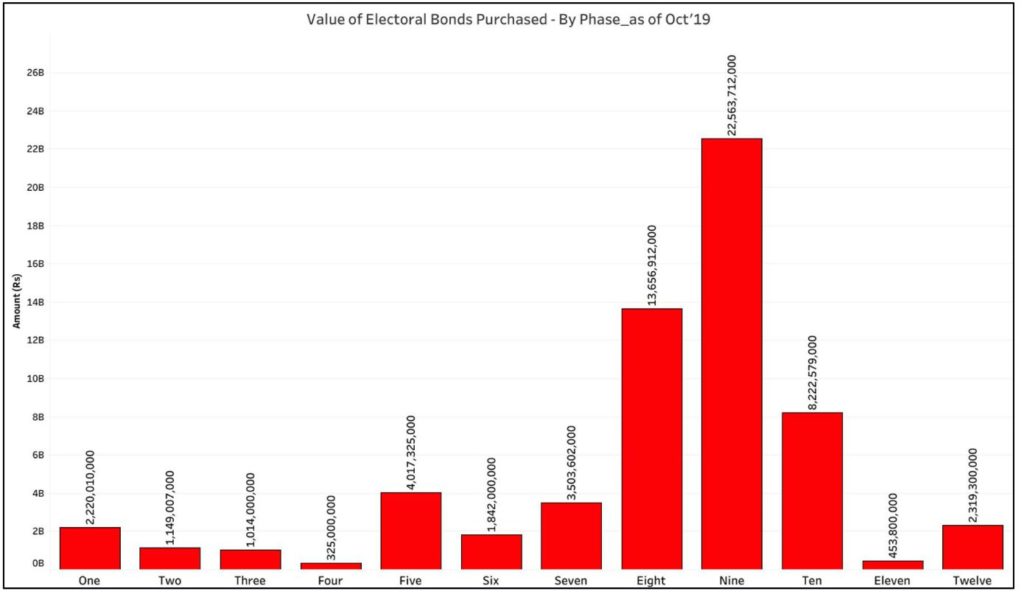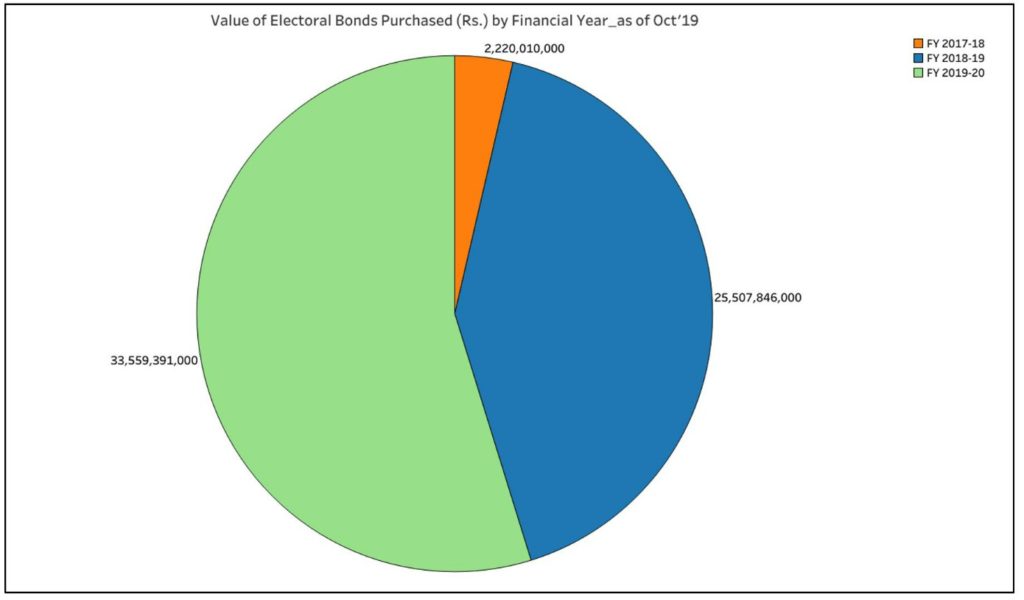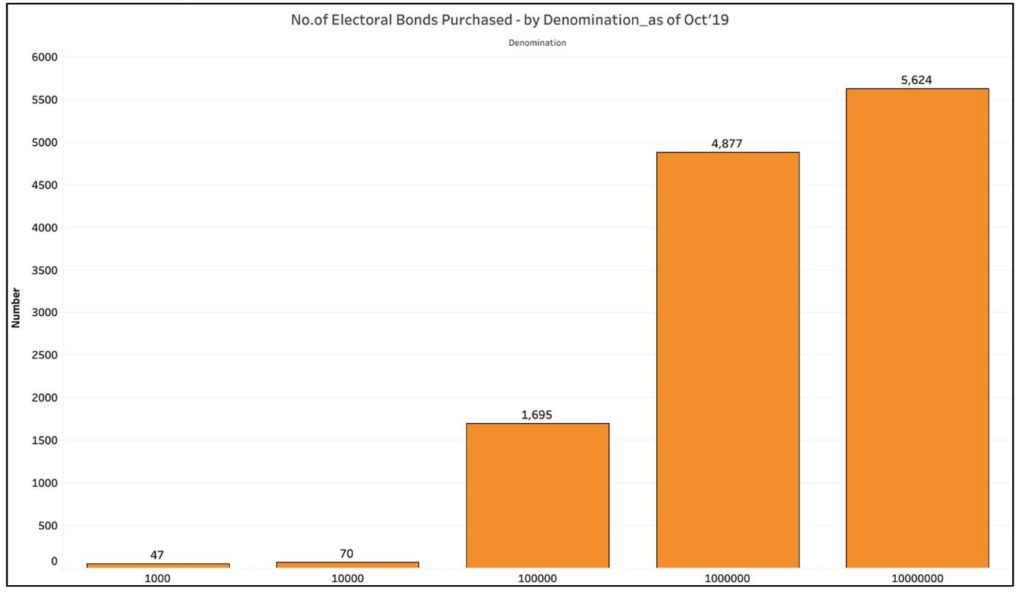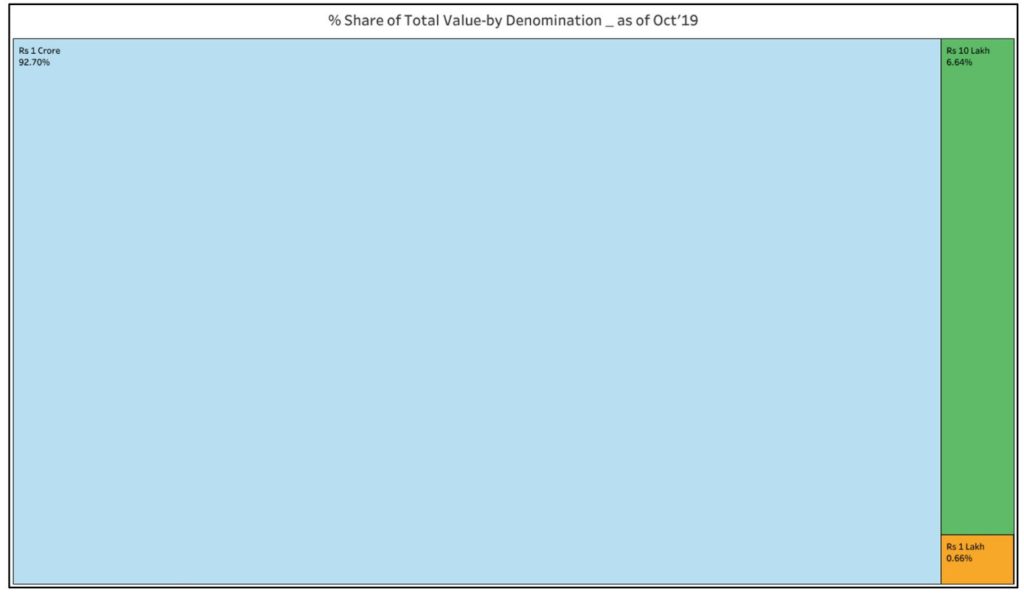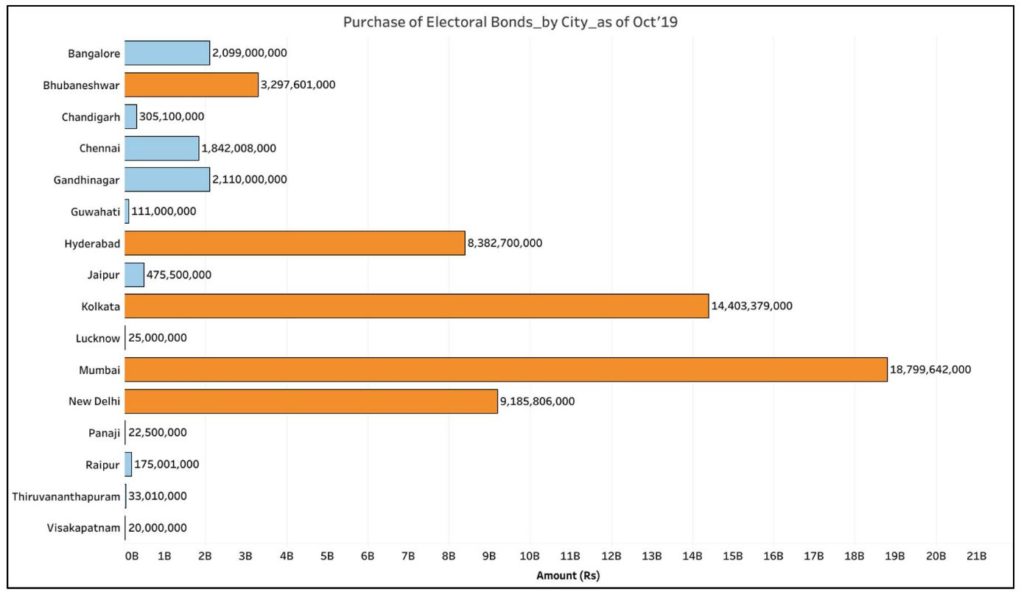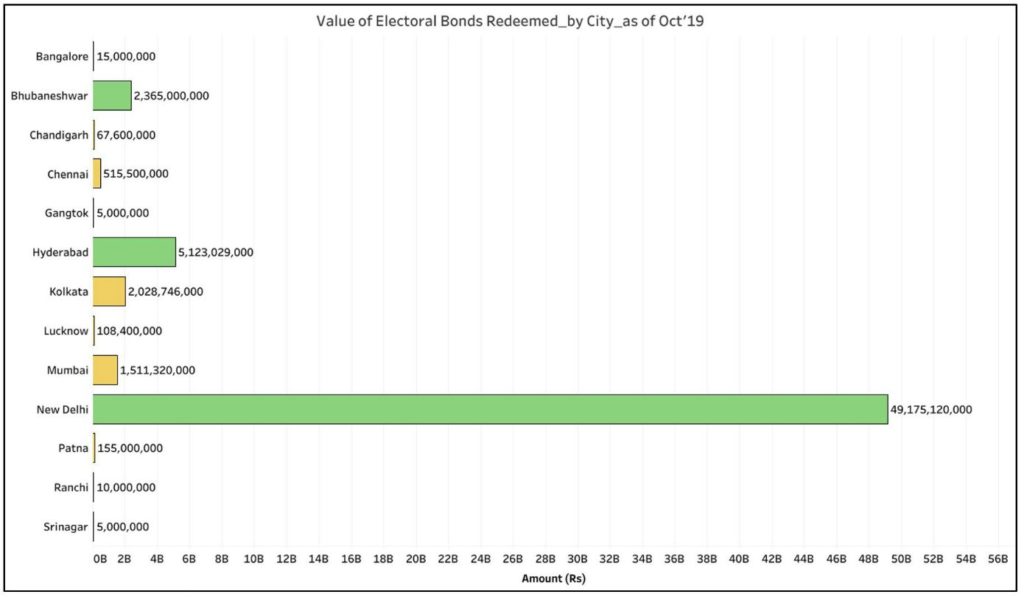More than Rs 6,000 crore worth of electoral bonds have been sold in 12 cycles so far. As many as 55% of these bonds were sold in 2019-20. To know which parties benefitted from electoral bonds, we may have to wait till October 2020 or more, by when political parties are supposed to submit their audit reports for 2019-20.
The electoral bonds scheme was notified by the Central government on January 2, 2018, after the initial announcement during the 2017-18 Budget. One of the main reasons cited for the introduction of the electoral bond scheme was to have control on unaccounted money flowing into the political system and to improve financial transparency.
Factly had earlier published an explainer about the specifics of electoral bonds. Over the nearly two-year period since the introduction of these bonds, there were multiple debates and ongoing discussions regarding the effectiveness of electoral bonds in bringing in transparency and the scope of them being misused as options for introducing non-traceable money into the political system.
Also read: Electoral Bonds Worth Over Rs 3,600 Crore Sold in March, April 2019: RTI Response
While the debate ensues, here is a comprehensive analysis of the numbers related to electoral bonds since their inception. Factly has filed multiple RTIs and the following analysis is based on the information received from State Bank of India (SBI).
Most electoral bonds was sold in April 2019
Since March 1, 2019 till date, there were 12 windows open for the purchase of electoral bonds across various branches of SBI in different cities. The 9th phase and the 8th phase were during April 2019 and March 2019 and had the longest window period with 20 days and 15 days respectively.
The highest value of electoral bonds sold was during the 9th phase i.e. April 1 – April 20, 2019. A total of Rs 2,256.4 crores worth of electoral bonds were sold during this phase. The next highest was the earlier phase i.e. 8th phase between March 1 – March 15, 2019, when bonds worth Rs 1365.7 crores were sold.
Significantly in the 10th phase, which was for a shorter duration of only five days between May 6 and May 10, 2019, the third-highest amount of electoral bonds were sold, of Rs 822. 25 crores.
It needs to be noted that all these three phases were during the period of 2019 Lok Sabha elections. Hence a total of Rs 4,444.32 crores worth electoral bonds were purchased during these three phases, during the general elections. In other words, close to 73% of the electoral bonds by value were sold in just these three phases.
55% of the electoral bonds were sold in 2019-20
So far, a total of Rs 3,355.93 crores worth of electoral bonds were sold in the current financial year of 2019-20. This is higher than the whole of the previous financial year which was Rs 2,550.78 crores. For the financial year 2017-18, which had only one phase i.e. the first phase during March 2018 has recorded purchases worth Rs 220 crores.
99.7% of the bonds purchased by value are of Rs 1 crore & Rs 10 lakh denominations
The electoral bonds are available in denominations of Rs 1,000, Rs 10,000, Rs, 1,00,000, Rs 10,00,000 and Rs 1,00,00,000. Until the latest window period (October 2019), a total of 12, 313 electoral bonds of various denominations were purchased.
A major portion of them is the highest value denomination of Rs 1 crore (5,624 bonds) followed by the next highest denomination of Rs 10 lakh (4,877 bonds). A total of 1,695 bonds of Rs 1 lakh denomination were sold in these 12 cycles. Meanwhile, the purchases made for the lower denominations of one thousand and ten thousand are only 47 and 70 electoral bonds respectively.
While the electoral bonds with the highest denomination of Rs 1 crore form 45.68% of the total number of electoral bonds, their value makes up for 91.76% of the total worth. This is exceedingly high compared to the value of other denominations with the value of Rs 10 lakh denominations amounting to 7.95% and Rs 1 lakh denominations being only 0.27 %. The share of the lower denominations in the total value is negligible.
The higher value of the bonds being purchased indicates that the electoral bonds are being purchased by corporates rather than individuals, although there could be certain exceptions.
Most of the bonds were purchased from Mumbai followed by Kolkata and New Delhi
Electoral bonds were sold through SBI branches spread across 29 cities in India. The SBI branch in Mumbai witnessed the highest purchase of electoral bonds worth of Rs 1879.96 crores. The second highest value of bonds is purchased from Kolkata with Rs 1,440.33 crores followed by the national capital of New Delhi with Rs 918.58 crores.
However, when it comes to the number of bonds purchased, Kolkata tops with 3,478 electoral bonds purchased followed by Mumbai with 2899. The cities of Hyderabad and Bhubaneswar, whose respective states have also had assembly elections during the last 18 months recorded the fourth and fifth-highest value of electoral bonds purchased.
Nearly 80.5% of the electoral bonds were redeemed in New Delhi
While purchasing the electoral bonds is one side of the coin, the other side is redeeming them. Out of the approximate Rs 6,128.72 crores worth of electoral bonds that were purchased, 99.67% of them i.e. approximately Rs 6108.47 crores were redeemed by the political parties.
In terms of the number of bonds, 12,173 out of 12,313 electoral bonds were redeemed. The political parties are required to redeem an electoral bond within 15 days. Else, the amount would be transferred to PMNRF (Prime Minister’s National Relief Fund). Approximately Rs 20.25 crores have been transferred to PMNRF due to the non-redeemed bonds so far. Nearly half of it i.e. Rs 10 crores relate to bonds purchased during third phase i.e. May 2018 while 74 of the 140 non-redeemed bonds belonged to the 9th phase.
Also read: The Jurisprudence of the Fait Accompli
While Mumbai and Kolkata are the cities where the highest amount of electoral bonds were purchased, it is New Delhi where the largest share of the purchased bonds were redeemed. The total value of electoral bonds redeemed in New Delhi is Rs 4,917.51 crores which make up to nearly 80.5% of the total amount. A total of 8,903 out of 12,313 bonds were redeemed in New Delhi.
The second-highest amount of electoral bonds were redeemed in Hyderabad amounting to Rs 512.3 crores from 1,255 bonds. It is followed by Bhubaneswar with Rs 2,36.5 crores from 484 bonds. Although the value of bonds redeemed in Mumbai and Kolkata are lesser than Bhubaneswar the number of bonds is higher with 553 and 713 respectively.
As per the guidelines of the scheme, no political party can have more than one current account in SBI for the redemption of these bonds. So, it is natural that the national parties maintain such a current account in Delhi while the regional parties in the respective state capitals. This could mean that the national parties are the principal beneficiaries of this scheme cornering a high share of these bonds.
Audit reports submitted by political parties the only source for information on beneficiaries of electoral bonds
While the information received from SBI regarding the redemption of the bonds provides data on the value of bonds redeemed and the city from where they have been redeemed, it does not divulge information about the political parties or the beneficiaries of these bonds.
The only source of information to find out the quantum of electoral bonds redeemed by a political party is the annual audit report submitted by the party to the Election Commission of India (ECI). The annual audit report is supposed to be submitted by October 30 every year for the preceding financial year.
However as on today, not more than half of the political parties have submitted their annual audit report for 2018-19. BJP and INC, the two largest national parties are yet to submit their audit reports for 2018-19.
Who is benefitting from these bonds?
As noted earlier, a correlation can be made with the city where the bonds are redeemed and the political party since parties are required to redeem the electoral bonds only through a single bank account.
With New Delhi being the city with the highest amount of bonds redeemed, the national parties could be considered the principal beneficiaries of the bonds. The data from audit reports of 2017-18, corroborates this.
As per the audit reports submitted by the political parties for 2017-18, 95% of the electoral bonds purchased in 2017-18 went to the BJP.
Also read: BJP Knew Details of Electoral Bond Scheme Even Before the Final Draft Stage
The correlation between the city of redemption and the political party is strengthened by the quantum of bonds redeemed in Hyderabad and Bhubaneswar. Substantial amount of bonds was redeemed in both these cities. Odisha along with Andhra Pradesh and Telangana had assembly general elections during the last one year. As expected, the principal regional parties in these states like BJD, TRS and YSRCP are among the parties that declared substantial donations through electoral bonds in 2018-19. These three parties together declared an income of more than Rs 450 crores through electoral bonds in 2018-19.
We will not know the details of beneficiaries of 55% of the bonds until October 2020
The total income through electoral bonds as declared by the political parties who have submitted their audit reports for 2018-19 amounts to Rs 599.07 crores which is only 23.5% of the total electoral bonds purchased in 2018-19. In other words, the two national parties together could have cornered more than 70% worth of the bonds in 2018-19.
As per the data analysed earlier in the story, purchases made during April 2019 and May 2019 are among the highest, amounting to approximately Rs 3,078.62 crores. The beneficiaries of which we would only be able to know when the political parties submit their audit reports for 2019-20, in the later half of next year. In other words, the details of beneficiaries for electoral bonds worth more than Rs 3,300 crores will only be known in October 2020.
Delayed reporting serves no purpose
As of November 2019, nearly 76.5% of the electoral bonds purchased during 2018-19, cannot be traced to any specific political party. The delay & non-compliance by political parties defeats the purpose of any such reporting.
For any holistic analysis about the extent of funds received by political parties for the 2019 Lok Sabha general elections, one has to wait till October 2020, provided the political parties submit audit reports on time. This is because a significant portion of election bonds (73% of the worth till date) were purchased during March 2019, April 2019 and May 2019. Thus, any analysis has to wait till the submission of audit reports for 2019-20. However, as per the trends highlighted by us earlier, most of the political parties, especially the BJP & INC are not known for on-time submission of the audit reports.
This delay hampers any meaningful analysis of political party funding. The non-disclosure clause (anonymity) attached with the Electoral bonds scheme prevents disclosure of any information regarding the beneficiaries through RTI. The only way out is for the rules to be revised that mandate political parties to submit a report on electoral bonds received within a stipulated cut-off date post-election.
This article was originally published in Factly and has been republished on a Creative Commons (CC BY 4.0) licence.






